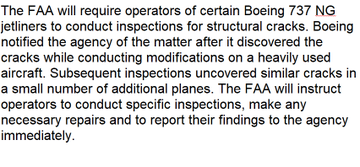Unexpected cracking found on critical Boeing 737 Next Generation part
Boeing engineers and safety investigators are scrambling to find out how many Boeing 737NGs have cracked 'pickle forks' after finding several in the jets.
A pickle fork is the part that helps attach a plane's fuselage to its wing structure. It helps manage the stress, torque and aerodynamic forces that bend the connection between the wings and the body of the jet.
Engineers design pickle forks to last the lifetime of the plane, more than 90,000 landings and takeoffs, a term known as "flight cycles" in the aviation industry, without developing cracks. There could be dire results if the pickle fork system on the jet fails in flight.
During a recent inspection, workers found a severely cracked pickle fork on a Boeing 737NG. The plane is relatively young, having logged approximately 35,000 flight cycles when the damage was found.
A retired Boeing engineer who asked to remain anonymous tells us, "It's unusual to have a crack in the pickle fork. It's not designed to crack that way at all. Period."
He says it's particularly concerning because it was found so early in the plane's service.
Another source tells us Boeing quickly reported the issue with the single plane to the FAA last week, and now more planes with similar cracking have been found.
We're told this is very much an ongoing investigation, and that it's unclear whether or not this is a widespread issue.
BREAKING: Cracks found in critical part (called a pickle fork) that keeps wing attached to 737-NG (not MAX) fuselage. One found earlier in month, now more on other planes. Found early in plane's lifespan. Boe & FAA scrambling to find extent of problem. @KOMONewsradio #KOMONews
204 people are talking about this
Boeing confirmed to KOMO Friday that there is a cracking issue.
"Safety and quality are our top priorities. Boeing has notified the FAA and been in contact with 737NG operators about a cracking issue discovered on a small number of airplanes undergoing modifications. No in-service issues have been reported. Over the coming days, we will work closely with our customers to implement a recommended inspection plan for certain airplanes in the fleet. This issue does not affect any 737 MAX airplanes or the P-8 Poseidon," a Boeing spokesperson wrote.
The FAA also confirmed the inspections, telling KOMO, "The FAA will require operators of certain Boeing 737NG jetliners to conduct inspections for structural cracks. Boeing notified the agency of the matter after it discovered the cracks while conducting modifications on a heavily used aircraft. Subsequent inspections uncovered similar cracks in a small number of additional planes. The FAA will instruct operators to conduct specific inspections, make any necessary repairs and to report their findings to the agency immediately."
No one has been injured, and there have been no reports of issues on 737s that flew with the cracked equipment. It's a near certainty that people flew aboard the jets with the cracked pickle forks before the issue was discovered.
We're told this is an issue that is being taken seriously by the FAA and Boeing.
The pickle fork is essential to the safety of the plane and an in-flight failure could be catastrophic in the worst-case scenario.
A government source says that until the scope of the problem can be understood, it's difficult to tell what corrective actions will need to be taken. It could be anything from visual inspections of all 737NGs, or more unlikely, a grounding of the planes for further inspections. Investigators are deeply concerned about the cracks developing so early on in a the plane's lifespan.
Engineers say the inspection process itself is fairly straightforward and fast. 737NGs are the generation of models made prior to the 737 MAX. The 737NG is the model designated as 737-600, 737-700, 737-800, or 737-900. It started production 1996. The last one rolled off the factory floor this summer in Renton.
Light cracking is occasionally found in pickle forks, but it's very unusual.
Engineers say fatigue cracking, once initiated, grows every flight.
If a slight crack is discovered during a routine inspection, engineers run a scenario for how much they expect it to grow under typical conditions, then re-inspect at prescribed intervals.
"A crack like this is similar to when you see a crack in a coffee cup handle," the retired engineer tells us. "You can likely continue using the cup several more times, but there's always a risk that handle will break off and hot coffee will wind up in your lap."
Teams in Seattle and Washington, D.C are working on this. A source within the federal government says FAA inspectors were excited and happy to get the call from Boeing.
The source says they are "...elated that the bloodline of safety is alive at Boeing." That same source worries about how economic concerns for Boeing impact safety.
Just this week, Boeing re-organized its management structure when it comes to safety. There's even a committee on the Board of Directors now with direct oversight of safety.
Until the extent of the issue is discovered, it will be difficult to determine what maintenance crews will need to do. So far, there have been no government orders for mandatory inspections.
Boeing and the FAA will want to know why the pickle forks are cracking, and why it's happening so early. We're told it could be something as simple as a manufacturing flaw with a small number of planes and not something widespread.
This could be a pain for scheduled maintenance on planes. We're told a "fix" to a pickle fork with extensive of cracking will require mechanics to remove and replace the pickle fork fitting. It stretches around 25% of the circumference of the fuselage. A Boeing 737 has four pickle forks.
The retired engineer tells KOMO the cracks were really surprising, used an expletive, then said, "This is not good news," and added, "It's really urgent to investigate."




